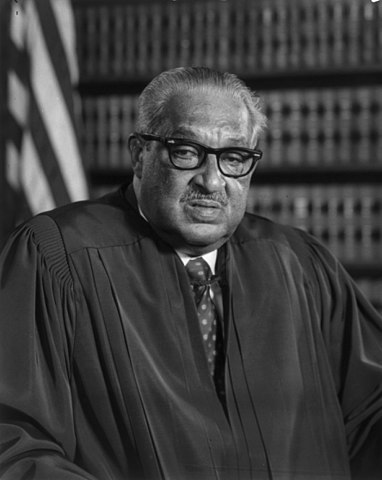Thurgood Marshall Nominated to the Supreme Court
It was “the right thing to do, the right time to do it, the right man and the right place,” said former President Lyndon B. Johnson when he nominated Thurgood Marshall to the Supreme Court on June 13, 1967. Marshall became the first African-American appointed to the high court.
Marshall, who grew up in Baltimore, Maryland, was an above-average student and a star member of the debate team. After graduating from high school, he attended Lincoln University in Pennsylvania and graduated with honors in 1930. He applied to the University of Maryland Law School but was rejected because of his race. This experience left a lasting impression on Marshall and helped set the course for his future career.

Marshall was accepted to and attended Howard University Law School and graduated with honors in 1933. In 1934, he began working with a local branch of the NAACP and moved on to full-time legal counsel in New York. Marshall won a variety of cases with the NAACP, including Brown v. Board of Education and helped to jumpstart the Civil Rights Movement.
Former President John F. Kennedy appointed Marshall as a judge for the U.S. Second Circuit Court of Appeals. In 1965, his successor, Lyndon B. Johnson, appointed Marshall to serve as the first Black U.S. solicitor general prior to being nominated for the Supreme Court. In 1967, President Johnson nominated Marshall to fill the seat of retiring Associate Justice Tom Clark.
After some debate in the Senate, Marshall was confirmed and sworn in as a Supreme Court Justice. Marshall joined a liberal Supreme Court that was led by Chief Justice Earl Warren and that aligned with Marshall’s views on politics and the Constitution. While on the Supreme Court, Marshall typically supported rulings that upheld individual rights and challenged controversial social issues.
In the 1972 Furman v. Georgia case, Marshall expressed that the death penalty was unconstitutional in all circumstances and he also ruled in favor of the right to abortion in the landmark Roe v. Wade case.
Republican presidents were able to appoint eight consecutive justices to the court during Marshall’s tenure and he gradually became the liberal voice of an increasingly conservative court.
After serving 24 years on the court, Marshall retired in 1991. He was replaced by Clarence Thomas replaced him.